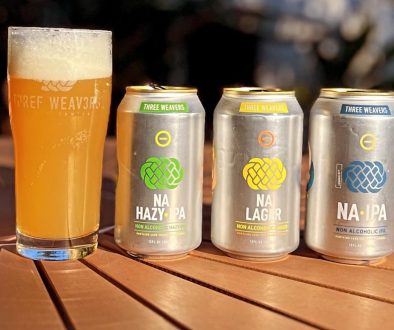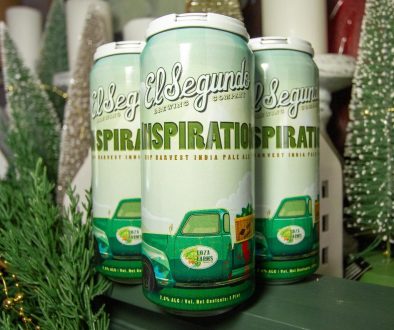Why Aren’t Other Big Beer Corps Vilified Like AB-InBev?
When I worked for an AB-InBev wholesaler, it often felt like I couldn’t catch a break. Caught between the Scylla and Charybdis of demands coming down from Budweiser and an educated market resistant to any brand that Budweiser touched was a battle that my colleagues and I fought daily. Between begging accounts to pick up kegs and cases of whatever ABI had demanded we sell and balancing the encroachment of craft brands onto our taps, it consistently raised the question for me: Why do people hate Budweiser so much?

After all, Molson-Coors produces ostensibly similar products, and uses the same playbook as ABI. Constellation Brands has its tentacles in every facet of the alcohol industry, and hungrily snatches up wine producers. Even Boston Beer is consistently accused of the same pay-for-play tactics that craft drinkers rail against from macros. Microbreweries continually produce products more misogynistic than even the most egregious Bud Light commercial. In short- nothing Budweiser does is something unique to them.
ABI is, however, the biggest and de-facto face of macro beer. In 2016 ABI brought in over 45.5 Billion dollars in revenue, and generated 4.85 Billion in profit. Their biggest rival, Molson-Coors, reported 3.8 Billion dollars in revenue the year before. Budweiser occupies roughly 45% of the market, whereas Molson-Coors takes up 28%. Craft Beer takes up a bit over 12% of the market in comparison, and accounts for 20% of the dollar share. In short- ABI dominates the market both domestically and internationally in a way that makes them the first brand most consumers think about when the think of a beer.
In the same way that McDonalds has become synonymous with fast food, ABI is equated with macro beer. While others in their industry do the exact same thing, InBev is first in the firing line. Burger King and Yum! Brands serve identical (or worse) food and engage in the same practices, but critics of fast food will consistently criticize McDonalds first.
The InBev-McDonalds comparison is more apt when you consider their market strategy. ABI, and McDonalds, are rarely the first to market with a product, instead introducing products to compete with already established rivals. Southern Style Chicken to combat Chick-Fil-A, artisanal bistro sandwiches to go after Panera, and sugary coffee drinks to target Starbucks mirror Budweiser’s development of brands to compete with other products that were taking their market share. While Bud Light is the omnipresent domestic beer, it was by no means the first. Miller Lite was introduced nigh a decade before Bud, and Budweiser was so convinced that light beer was a fad that would go away they hesitated to brew a light version of Budweiser, instead creating the Natural Light brand to compete in that space. Budweiser has continued this trend for decades, introducing ultra-light beers, wheat beers, ciders, and recently even alcoholic sodas in their continual quest for market share.
It’s also worth noting that since 2009 ABI has bought out some of its biggest international rivals. SAB Miller and Grupo Modelo are both controlled by ABI internationally, while in the United States they’re owned by Molson-Coors and Constellation Brands. The only reason we’re not living under a Budweiser-based hegemony is because of reasonable anti-monopoly regulations.
ABI’s massive size compared to their US rivals makes it easy for Molson-Coors and others to slip under the radar. In the wake of the Wicked Weed buyout, Heineken was able to secure total ownership of Lagunitas without incident. If you read lists of “imposter brands”, it’s worth noting that it only lists brands owned by ABI, leaving out other brands that easily qualify like Terrapin or Leinenkugel. Ballast Point is owned by Constellation but comes under significantly less scrutiny.
It’s the brazenness of ABI constantly adding craft breweries to their portfolio while simultaneous stymieing the growth of the industry by throwing blank checks in any direction they can is at the core of this disdain. ABI own advertising campaigns proudly self-identifying as Macro Beer positions them as the enemy of craft, taking on a position as the grand antagonist to the small brewers that have fought tooth and nail to find purchase in their communities. ABI has declared itself as the opposition, and in doing so represents the unabashed greed of the megacorporation draining the life out of small businesses through crooked legislation and nigh-infinite wealth in the pursuit of a slightly increased market share and an increase in their stock value.
Molson-Coors and others have opted to stay out of the spotlight, allowing ABI to take the brunt of anti-macro sentiment. They also don’t purchase shares in beer websites or buy out massive hop farms to prevent craft brewers from getting access. Through their aggression and need to have fingers in every pot ABI has claimed the title of Macro and defined itself as the enemy, and by doing so given other companies the ability to distance themselves from the title of big beer and take a position as the alternative option. Just like the person going through the Wendy’s drive through reasoning that “It isn’t McDonalds” , craft drinkers will find themselves at barbecues and beaches this summer and reach into coolers for cold Miller Lites or Coronas, and they’ll resign to themselves “At least it’s not Budweiser.”




April 10, 2018 @ 10:35 am
I love beer – lagers, imperial stouts, pilsners, ipas, etc. The end product is ALL that should matter. Why are craft beer snobs so caught up on image while the rest of the world drinks what they like and can afford? I mean, with the hipster types, it makes sense because they live in a bizarre paradox of proudly being a part of a conformity they claim to despise. But the rest I just don’t get. If Budweiser tastes good don’t let an imagined false sense of inferiority stop your consumption. It’s okay to support the robot.
July 6, 2017 @ 11:16 am
I’m curious as to what the anti-craft policies and lobbying efforts that everyone keeps referring to are? In every anti-ABINBEV post, people keep referring to these, but it doesn’t seem like many people know what they are. The only legislation I can think of in recent history, are the Craft Beverage Modernization and Tax Reform Act and the Texas Tap Room Bill, which ABINBEV and the Brewer’s Association are on the same sides. Not saying there isn’t any, just generally curious.
June 27, 2017 @ 3:49 pm
It’s ashamed that ABI was allowed such reach by the government. Was it even part of the conversation that ABI would control the world for key ingredients and/or suppplies? Much less the acquisitions of craft brewers is an end around to change the way beer is distributed. The DOJ limited the volume that can go through the ABI owned distributors. So instead let’s buy craft brewers, distribute beer through brew pubs continuing to grow volume through multiple distribution points.
ABI is a financial company that brews beer for now with a vision for most beverages and the related raw materials & supplies.
The more of the supply chain they control, the more profit they hold
June 21, 2017 @ 11:33 am
@ Chris M
Sam is a former AB distributor, this is not a paid placement, the point of the article, which seems clear to us is why the other big brewers don’t get nearly the same amount of heat as AB InBev does, and those points are outlined.
June 15, 2017 @ 10:56 pm
Note: this isn’t an editorial, it’s a paid placement. It also starts with a lie, as the author is STILL an ABI employee (Harris Beverages in NC). Hey Full Pint, be honest: was this paid placement? And if so, why would you then label it as Editorial content?
June 14, 2017 @ 7:44 pm
you almost got it, but still missed the bullseye: ABI expresses an utter loathing of craft beer at a visceral level. Their policies seek to destroy, undermine, or subvert anyone who dares to refuse to drink their products. This visceral hatred comes over loud and clear to anyone who cares about craft.
As to your last paragraph: no, there will be no Corona or Miller or what have you at any of the parties or cookouts my friends attend. We drink craft, not crap.
June 14, 2017 @ 4:14 pm
It seems the title of this post is rhetorical since you appear to have answered your own question towards the end – it’s not just that they are “big beer” it’s the antagonism, like openly mocking craft beer and their drinkers then turning around and buying up those breweries . It’s paying for tap handles and shelf space, anti-competitive monopolistic business practices that the little guys can’t fight fairly. You pretty much nailed it in the last two paragraphs
June 14, 2017 @ 2:56 pm
I beliee that it’s mainly because ABI is so anti-craft. Their lobbyists routinely try to introduce anti-craft brewery legislation around the country. A portion of every dollar spent on an ABI product thwarts craft brewing on some level.
June 14, 2017 @ 2:50 pm
The thing that rubs me the wrong way the most, is the way they belittle craft breweries while trying to swallow, buy, gobble, slurp them all up in order to eliminate the competition.
I also know several people who work at our local Bud “factory” who can’t stand their own employer and are drooling at the thought of retirement. They tell me the quality of the product is nowhere near where it used to be before INBEV’s hostile takeover. Since being bought out, the QC is next to zero. Makes me squirm.
June 14, 2017 @ 9:22 am
Excellent.